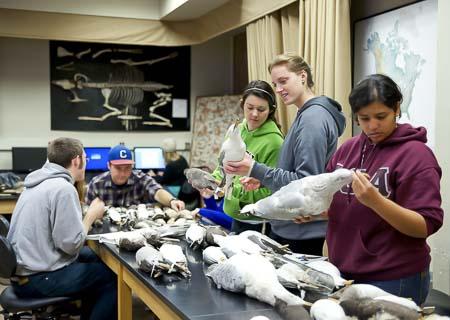Breadcrumb
Instruction

The Wildlife Department at Cal Poly Humboldt offers students a diversity of classes focused on the management of habitats, distinct taxonomic groups, and statistical analysis.
Unique to the Wildlife Department are many lower and upper division classes dedicated to ornithology. Below is a list and brief description of ornithological courses offered through the Wildlife Department.
WLDF 306
Birds & Human Society (3 credits)
This class broadly covers the distribution, ecology, and behavior of birds and how these avian attributes influenced human history, sciences, arts, economy, culture.
WLDF 365
Ornithology I (3 credits)
This is the Wildlife Department’s keystone Ornithology class and serves as a required course for all Wildlife undergraduates. Ornithology is a field heavy class where students study birds in a diversity of habitats throughout Humboldt County. The course also relies on the Wildlife Department’s extensive museum collection to learn the finer points of species delineations during laboratory sessions. Lecture portions of the class focus on life histories, ecology, behavior, and special adaptations of birds.
WLDF 420
Management of Waterfowl (3 credits)
Arcata is located along the Pacific Flyway and hosts diverse assemblages of waterfowl during migratory and wintering periods. The Wildlife Department’s Waterfowl Course integrates field study with rigorous lecture and laboratory sessions to learn the life histories, ecology, behavior, management of waterfowl and allied species.
WLDF 423
Management Nongame Wildlife (3 credits)
Non-game ecology and management has become an increasingly important component of undergraduate curriculum in the Wildlife Department. As such, the Nongame Management Course is dedicated to the ecology, taxonomy and management of specific ecological and taxonomic groups. The focus of the course varies year-to-year but most often focuses on the following taxonomic groups
- Landbirds (songbirds, woodpeckers, hummingbirds, and allies)
- Pelagic birds (tubenoses, alcids, larids, and allies)
- Raptors (hawks, eagles, falcons, kites, and allies)
- Shorebirds (sandpipers, plovers, and allies)
- Water birds (wading, shorebirds, and pelagic birds)
WLDF 565
Advanced Topics in Ornithology (1- 3 credits)
The Wildlife Department’s graduate level avian ecology course focused on advanced topics in ornithology. The class is comprised of small groups of students that participate in directed field work, lectures, discussion and reading groups. Course topics vary year-to-year but most often focus on the evolution, function and analysis of following subject matter:
- Song
- Migration
- Molts & plumages





